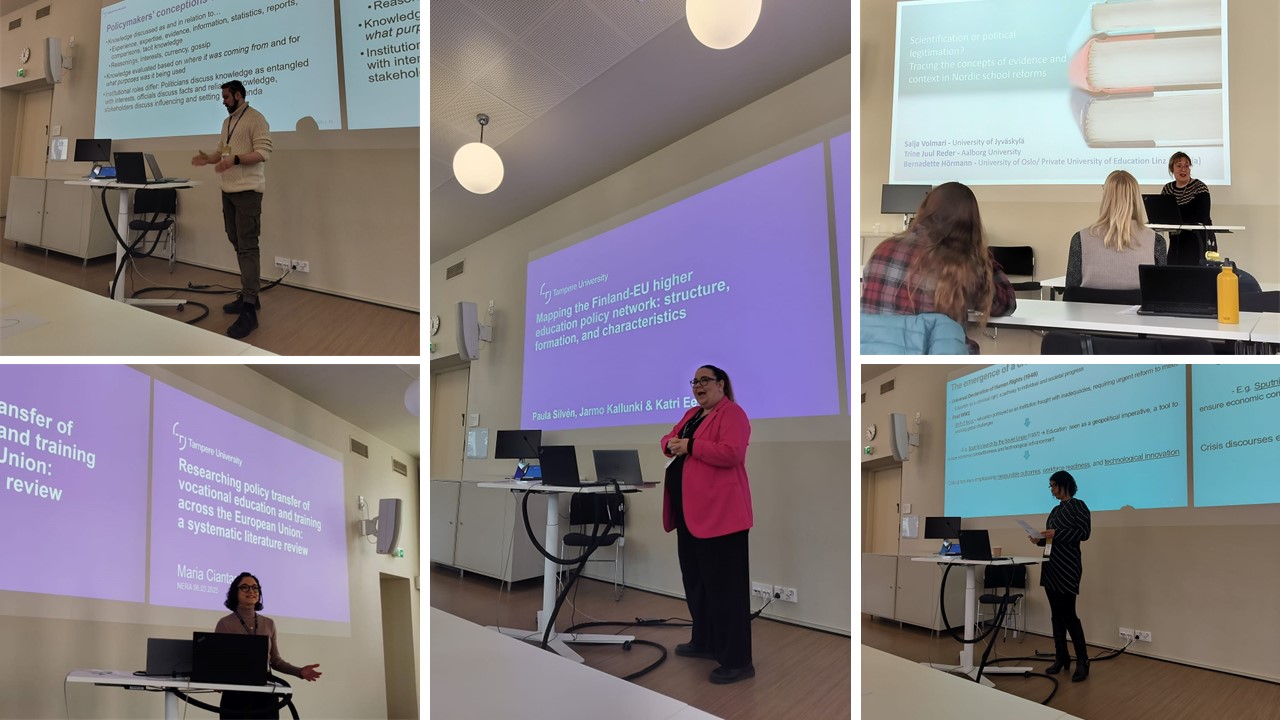Saija Volmari presented a recent research article, in which they (Saija Volmari, Trine Juul Reder, Bernadette Hörmann) studied how small c contexts and big C Contexts connected to evidence use in curriculum and school reforms in Denmark, Finland, and Norway. Findings indicate that ’what works’ in education reforms is co-constructed via complex entanglements of actors, knowledge, and discourses, and what is considered evidence is highly context specific. The authors further asserted that role of knowledge and evidence-based policymaking is crucial in shaping ‘big C contexts’ in education and there is hence the need for more critical research on evidence-based policymaking in school reforms. Full article: Scientification or political legitimation? Tracing the concepts of evidence and context in Nordic school reforms
Íris Santos presented a study where they (Íris Santos & Iveta Silova) discuss how crisis epistemology is used by international organisations, led by countries in Global North to articulate narratives of ”learning crisis” to legitimise their existance and work. Preliminary results show that narratives of the learning crisis are used to legitimize the interventions of international organizations, positioning them as essential actors in solving global education challenges. This narrative, however, tends to overlook the historical and structural factors, such as colonialism, and global economic inequalities, as contributing factors to the so-called learning crisis. The research suggests that a decolonial approach, which centers local contexts and knowledge systems, is necessary for more equitable and effective global governance of education.
Maria Ciantar showcased her recent systematic literature review, which sought to investigate how VET (Vocational Education and Training) policy transfer has been studied in European Union member states. Maria argues that four key areas require attention for future studies: the lack of methodological diversity; data collected from specific policy transfer actors and the exclusion of others; the geographical spaces that remain unexamined; and the focus on particular VET practices at the centre of policy transfer. Full article: Researching policy transfer of vocational education and training across the European Union: a systematic literature review
Paula Silvén presented a study, in which they (Paula Silvén, Jarmo Kallunki, Katri Eeva) analysed the higher education (HE) policy-making network that operates at the interface of Finnish and European policy spaces. Results show that the autonomy of Finnish universities and the EU’s limited competence in educational matters impacts the structure of the Finland-EU HE policy networks. Finnish universities, due to their constitutional and legislative autonomy, play a central role in these networks. The EU’s lack of formal competence in education matters positions member states also at the network’s core. Additionally, Nordic corporatist policy-making tradition influences network formation. This study was part of the KNETS-project.
Joni Forsell presented a study, in which they (Joni Forsell & Jaakko Kauko) sought to examine how norms framed knowledge and its use in Finland-European Union policymaking networks. Results show that politicians’, officials’, and stakeholders’ conceptualizations of knowledge are diverse and fluid, and they exhibit role-specific articulations of shared norms. Three norms are identified: First norm sees that the credibility of knowledge is dependent to the degree of trustworthiness of the people or organizations in the network. Second norm relates to the reliability of the source of knowledge, meaning that knowledge is to be evaluated based on whose interests or agenda it supports. Third norm relates to holism: knowledge is to be formed in discussions with others and needs to consider multitude of sources and perspectives. This study was part of the KNETS-project.

